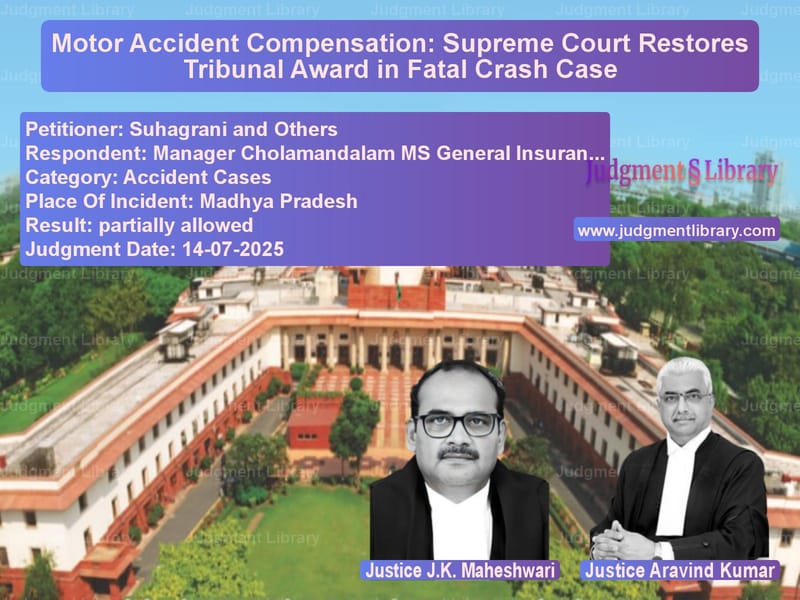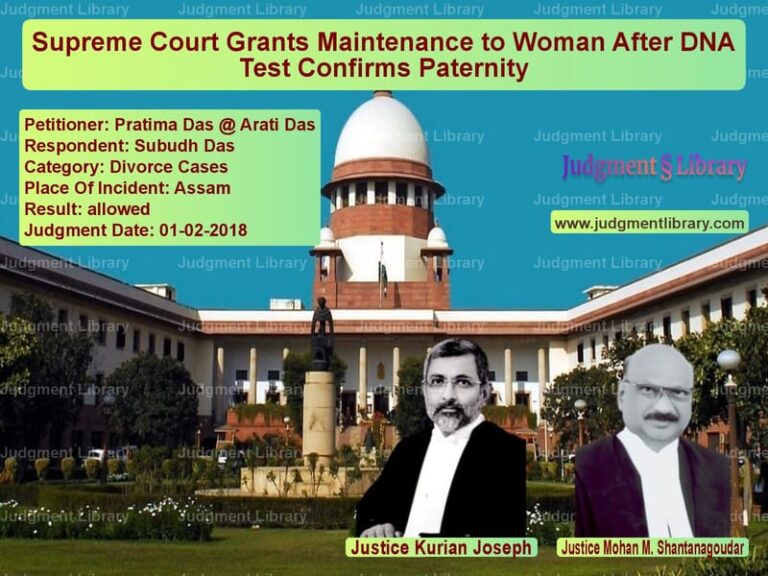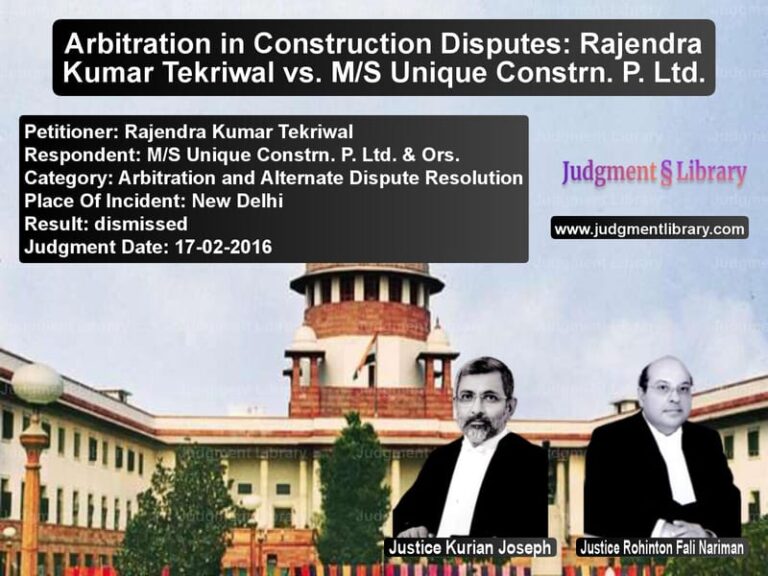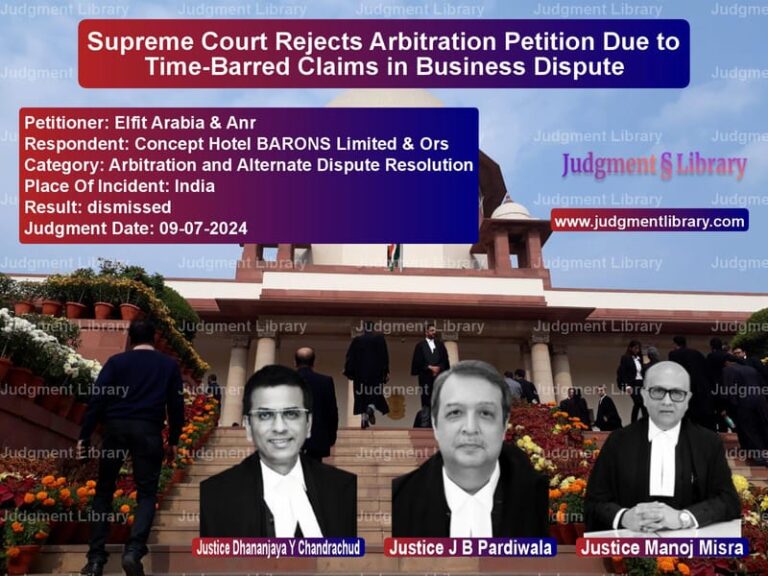Motor Accident Compensation: Supreme Court Restores Tribunal Award in Fatal Crash Case
The Supreme Court of India recently delivered a significant judgment in a motor accident claim case that provides important guidance on how courts should evaluate evidence in fatal road accident cases. The case involved a tragic incident where Nathuram Ahirwar lost his life in a motorcycle accident, leaving behind his wife and three children who sought compensation for their devastating loss.
The legal battle spanned multiple courts, starting from the Motor Accidents Claims Tribunal (MACT) in Sagar, Madhya Pradesh, to the High Court, and finally to the Supreme Court. The case centered around whether the accident was caused by a mini-truck hitting the deceased’s motorcycle from behind or whether the deceased had simply lost balance and fallen from his own vehicle.
The Supreme Court’s judgment not only restored the compensation awarded by the Tribunal but also provided crucial insights into how evidence should be evaluated in motor accident cases, particularly when dealing with conflicting statements and the testimony of eyewitnesses.
The Tragic Accident and Initial Proceedings
On September 24, 2021, Nathuram Ahirwar was riding his motorcycle with his wife, Suhagrani, as a pillion rider. According to the claimants, their motorcycle was hit from behind by a mini-truck (Ape pick-up vehicle) bearing registration number MP 04 GB 5604. The impact caused both the deceased and his wife to fall, resulting in severe injuries to Nathuram. Despite receiving medical treatment at multiple hospitals, he succumbed to his injuries on October 1, 2021.
The appellants, comprising Suhagrani (the widow) and her three children, filed a claim petition under Section 166 of the Motor Vehicles Act seeking compensation of Rs. 1,88,08,448. They contended that the accident occurred solely due to the rash and negligent driving of the mini-truck driver.
The insurance company, however, presented a completely different version of events. They argued that the accident occurred because the deceased himself lost balance while driving, causing him to fall from his motorcycle. The insurer alleged that the claimants had colluded with the driver of the mini-truck to fabricate the story of the mini-truck causing the accident. Additionally, they contended that even if the mini-truck was involved, its driver did not possess a valid driving license, which would absolve the insurance company of liability.
The Tribunal’s Decision
The Motor Accidents Claims Tribunal, after considering the evidence presented, delivered a well-reasoned award in favor of the claimants. The Tribunal examined the testimony of PW-1 (Suhagrani, the widow and eyewitness) and PW-2 (Naresh Kumar, one of the sons), along with 48 documents presented as evidence.
The Tribunal found that the accident was indeed caused by the mini-truck hitting the motorcycle from behind. Based on this finding, the Tribunal awarded total compensation of Rs. 12,43,324 with interest at 6% per annum from the date of filing the claim petition until payment.
The High Court’s Reversal
The insurance company challenged the Tribunal’s decision before the Madhya Pradesh High Court, which reversed the Tribunal’s award and dismissed the claim petition entirely. The High Court based its decision primarily on two grounds.
First, the High Court placed significant weight on a statement allegedly given by PW-2 (Naresh Kumar) to the police, which suggested that the deceased had fallen from the motorcycle due to imbalance rather than being hit by another vehicle. Second, the High Court found it suspicious that PW-1 (the eyewitness) had not seen the registration number of the offending vehicle and that the son-in-law, who allegedly saw the registration number, was not examined as a witness.
Arguments Before the Supreme Court
Before the Supreme Court, the appellants’ counsel argued that the Tribunal had passed a well-reasoned award after properly considering the evidence of PW-1, who was the best eyewitness as she was present at the scene of the accident. The counsel contended that the High Court committed a grave error by giving undue importance to PW-2’s alleged statement to the police, especially when PW-2 had denied giving such a statement during his testimony before the Tribunal.
The appellants also argued that the non-examination of the son-in-law was not fatal to their case, as there was overwhelming evidence establishing that the accident was caused by the offending vehicle. They additionally sought enhancement of the compensation, contending that the amount awarded by the Tribunal was inadequate.
The insurance company’s counsel supported the High Court’s judgment, arguing that when an eyewitness had initially stated before the police that the accident occurred due to the deceased losing balance, the Tribunal should not have discarded this evidence. The insurer maintained that the High Court rightly interfered with the Tribunal’s award.
Supreme Court’s Analysis and Findings
The Supreme Court, after hearing both parties and examining the evidence, delivered a comprehensive judgment that carefully analyzed the evidentiary aspects of the case.
The Court emphasized the importance of PW-1’s testimony, stating: “PW-1, the wife of the deceased who was the pillion rider was the best witness, as she was accompanying the deceased and was present at the time of the accident. She had entered the witness box and deposed as to the manner in which the accident had occurred.”
The Court also addressed the issue of the delayed filing of the complaint, noting: “Non-filing of the complaint immediately after the occurrence of the accident by her would not be fatal particularly when the near and dear of the claimants were in trauma and were attending to the immediate requirement of medical attention to the deceased. From the evidence on record it would reveal that appellants were running from one hospital to another as advised by the doctors to save the precious life of the husband of the first appellant.”
Regarding the contradictory statement attributed to PW-2, the Court made a crucial observation: “The High Court erred in not taking into consideration the fact that PW-2 when confronted while being cross-examined with his statement made to the jurisdictional police exhibit D-1 has denied having given such statement. He has also specifically deposed that he has not stated before the police that his father had fallen from the motorcycle on his own accord.”
The Court further noted that the insurance company had failed to examine the police officer who allegedly recorded PW-2’s statement, and no attempts were made to prove the contents of the disputed document. This procedural lapse significantly weakened the insurance company’s case.
Perhaps most importantly, the Supreme Court highlighted that the jurisdictional police had conducted a thorough investigation and filed a chargesheet against the driver of the offending vehicle. The Court stated: “The fact that the jurisdictional police had conducted investigation and recorded the statement of various persons during course of investigation had resulted in filing of the chargesheet against the driver of the offending vehicle which is not in dispute has been completely ignored by the High Court and it has proceeded to doubt the very occurrence of the accident, by ignoring the vital evidence available on record.”
Compensation Determination
While restoring the Tribunal’s finding on liability, the Supreme Court also addressed the compensation aspect. The appellants had argued that the compensation awarded by the Tribunal was inadequate, claiming that the deceased was engaged in agricultural farming and earned between Rs. 10,00,000 to Rs. 20,00,000 annually.
The Court, however, rejected this contention, stating: “Firstly, claim regarding the income of the deceased as pleaded cannot be accepted for the simple reason that apart from the self-assertion of the appellants, no documentary evidence of whatsoever nature has been placed on record to establish the same. Even if it is accepted that the deceased was earning income by carrying out agricultural operations and due to his death income from the agricultural land is not lost. The agricultural land has remained with the claimants and at the most the claimants would be entitled to be compensated for ‘supervision charges’ that they may have to incur in carrying out the agricultural operations.”
The Court also noted that the tribunal had appropriately considered the pension aspects and that any fresh computation would result in only marginal changes. Thus, the Court affirmed the compensation amount of Rs. 12,43,324 as just and reasonable.
However, the Court modified the apportionment of compensation, directing that 85% should go to the widow (appellant No. 1) and the remaining 15% should be equally divided among the three children (appellants No. 2 to 4).
Conclusion
The Supreme Court’s judgment in this case reinforces several important principles in motor accident claim cases. First, it emphasizes the primacy of eyewitness testimony, particularly when the witness was present at the scene of the accident. Second, it highlights that technicalities should not override substantive justice, especially when families are dealing with the trauma of losing a loved one. Third, it establishes that documentary evidence such as chargesheets filed by investigating authorities carry significant weight in determining liability.
The judgment serves as an important reminder that courts should take a compassionate and practical approach when evaluating evidence in motor accident cases, ensuring that genuine claimants receive the compensation they deserve without getting entangled in procedural technicalities.
Petitioner Name: Suhagrani and Others.Respondent Name: Manager Cholamandalam MS General Insurance Co. Ltd.Judgment By: Justice J.K. Maheshwari, Justice Aravind Kumar.Place Of Incident: Madhya Pradesh.Judgment Date: 14-07-2025.Result: partially allowed.
Don’t miss out on the full details! Download the complete judgment in PDF format below and gain valuable insights instantly!
Download Judgment: suhagrani-and-others-vs-manager-cholamandala-supreme-court-of-india-judgment-dated-14-07-2025.pdf
Directly Download Judgment: Directly download this Judgment
See all petitions in Road Accident Cases
See all petitions in Compensation Disputes
See all petitions in Motor Vehicle Act
See all petitions in Negligence Claims
See all petitions in Hit and Run Cases
See all petitions in Judgment by J.K. Maheshwari
See all petitions in Judgment by Aravind Kumar
See all petitions in partially allowed
See all petitions in supreme court of India judgments July 2025
See all petitions in 2025 judgments
See all posts in Accident Cases Category
See all allowed petitions in Accident Cases Category
See all Dismissed petitions in Accident Cases Category
See all partially allowed petitions in Accident Cases Category







